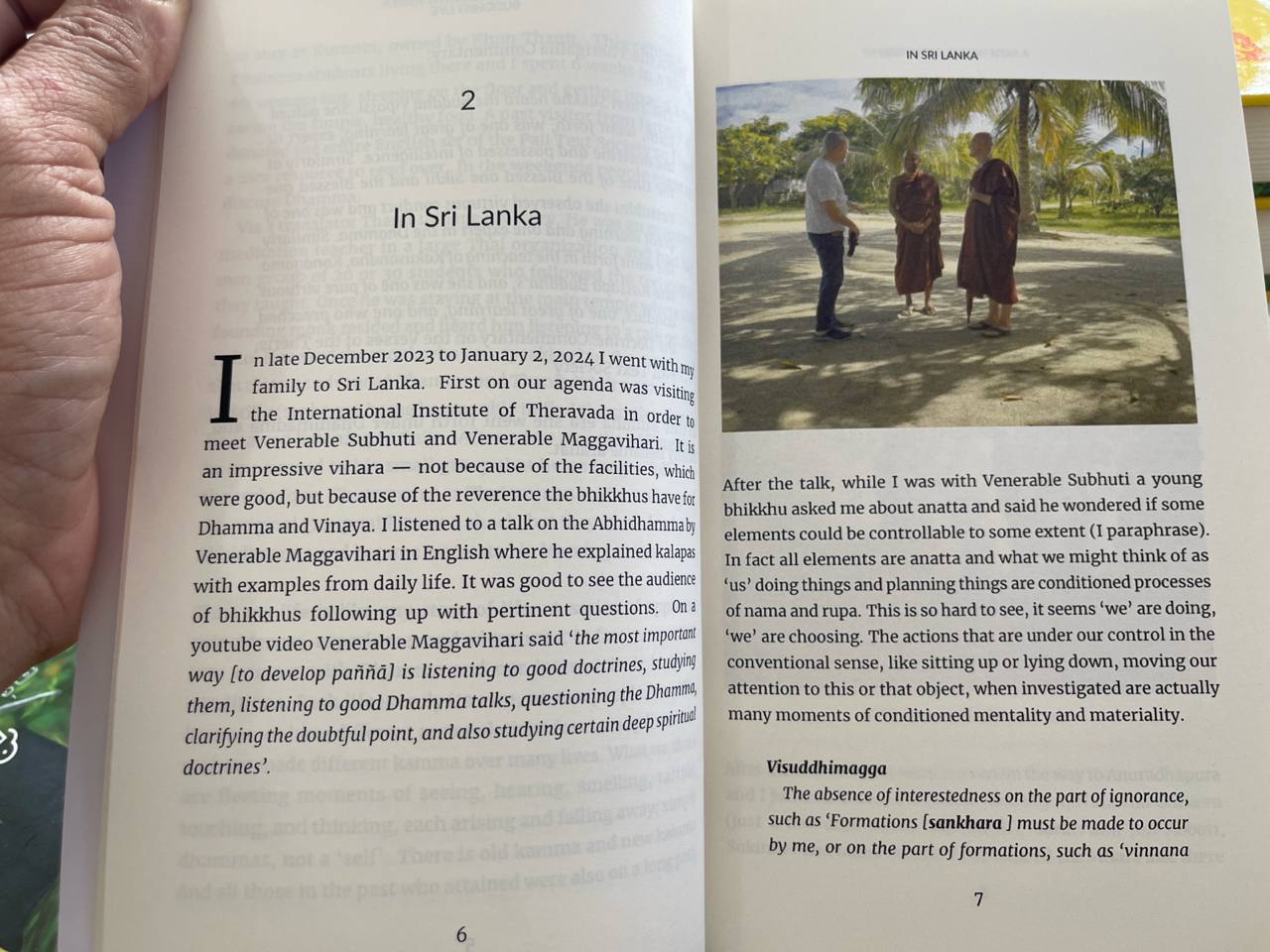From a book (1947) by a Sri lankan bhikkhu, the venerable Rerukane Chandavimala MahaThera Rerukane Chandawimala Thero - Wikipedia
https://groups.io/g/dsg/message/3474
In the preface the venerable says…
" There are 38 vangcaka dhammas are mentioned in netthippakarana atthakatha.
But they are mentioned only namely.
There are two tikas for the atthakatha but vangcaka dhammas are not
mentioned in
any of them."
" These arise in a mind that has developed a certain disliking towards
akusalas.
The akusala dhammas disguise
themselves according to the mind’s ‘tendency’ or mentality. ( as the mud
gets
the shape of the object that
pressed onto it.)"
In the book , the venerable describes the dhammas namely mentioned in the
atthakatha, and describes more
dhammas using his knowledge in the abhidhamma.
First , the ones from the atthakatha…
- apatikkulasagnamukhena kamacchando vangcethi
One develops the apatikkula sanna → Looking at every living or non-living
object in the same perspective.
Whether the dhathu in his body,in an alien body, rocks , trees, young body,
decayed body,… start to look the
same.
He has no disgust in the things that are disgusting to others.( phlegm,urine
etc…)
They look just collections of dhathus to him.
He will attend to the ones in need of help, without disgusted of the filth.
But Kamacchanda will disguise itself as apatikkulasanna.
One has liking to the praise , profits etc … gained by helping people.( But
he
knows this kamacchada is a bad
quality in him)
When theres a person in need , and others do not reach him beacause of the
patikula things associated with
helping ., theres a chance that in the former’s mind the kamacchanda will
arise
, and he helps the person without
feeling any disgust. But he thinks that apatikkula sanna has arose.
It is indeed real hard to distinguish the kusala from the akusala.
The only catch is to see whether this ‘apatikkula sanna’ is still there when
the
praises and profits are not
associated with the helping.
Another occasion is , a person may not feel disgust of the phlegm,urine etc
(
you know the lot) of another person
he has some raaga for.The person knows that raaga is ‘bad’ and apatikkula
sanna
is ‘good’, he tends to think that
what he has is the apatikkula sanna. But what he ’ gives in’( and gladly
develops) is none other than
kamacchanda.
As above the catch is to see whether this ‘apatikkula sanna’ prevails with
regarding a person who he has no
raaga for.
- patikkulasanna pathirupena vyapado vancethi
One develops patikkula sanna with regarding to dhathus. ( this helps to
fight
with excessive Raga
Whatever regarded beautiful in the normal sense , appears filthy to him.
(eg. the glowing teeth of a pretty person will look as melon seeds glued to
the
mouth of an empty clay pot)
But vyapada will disguise as patikkulasanna.
One knows vyapada is ‘bad’ and knows tha theres a good thing called
patikkula
sanna.
He will sometimes develop the raw vyapada , thinking that what he has is
patikkula sanna. [ story of sour
grapes…]
so checking is needed.
to be continued…
Cheats contd.
- samadhimukhena thinamiddhang vangcethi
When one is trying to concentrate , without moving the body, viriya
decreases.
( the tendency of the untrained mind is towards kamaraaga, not towards
samadhi )
So thinamiddha arises, the one who mistakes this as samadhi gives in to it .
(
so cheated )
- viriyarambhamukhena uddhaccang vangcethi
One over-tries to calm the mind, over-tries to understand things
he thinks that he’s developing viriya, but instead he’s cheated by uddhacca.
- sikkhakamathamukhena kukkuccang vangcethi
One who likes for moral restraint has the kusala - sikkhakamatha
But when one starts to worry about the things done , thinking whether they
were
allowed,not-allowed etc will develop the dvesha(dosa) rooted
santhapa.Eventually
kukkucca., mistaking it for sikkhakamatha.
- ubhayapakkha santhiranamukhena vicikicchang vangchethi
This dhamma is profound, and expands into large areas ie, merits/demerits,
kamma, rebirth, world systems, beings, jhanas etc…
This is initially ‘too much’ for an untrained mind, limited mind.
( to see the micro-organisms use of a microscope is needed, cant do it with
the
naked eye)
So there are more things to develop mentally and physically.
One feels that ’ I have to know all the reasons, all the scenarios, all the
logic,…then I’ll start going along the noble path’ … he mistakes this
for
the kusala dhamma ubhayapakkha santhirana, but its none other than the
vicikiccha.
His development stops, he starts to worry about things that will not lead to
progress.
vicikiccha ( in true appearence or in disguise) is unavoidable and a great
obstacle.
Beings have to develop more and more saddha to fight with and find out
vicikiccha.
(saddha indriya)
to be continued.
- ittanitta samuppekkhana mukhena sammoho vangceti.
the kusala dhamma ittanitta samuppekkhana - untrained mind takes pride,
delights …etc in ‘itta’ happenings,( fame, gains,praise etc… ) and will
entertain anger ,hatred towards ‘unitta’ happenings.(fear, shame, blame,
sorrow etc…)
The mind without tanha, conceit stays unwavered and steady in all
occasions.
This quality is complete only in arahants, but can be there in a certain
degree in puthujjanas and sekhas.
But sometimes, simply because failing to understand the true nature of
particular itta and anitta happenings, one stays ‘unwavered’ and calm. He
might think that this is his kusala , but that is the sammoha akusala
dhamma.
- attagnuta mukhena attani aparibhavena maano vangceti.
the kusala dhamma attagnuta - taking good care of one self , looking after
oneself, taking the full responsibility of oneself with reasoning is a
kusala dhamma praised by buddha in many occasions.
but the akusala maana can cheat by taking the shape of that quality,one can
mistake this attani aparibhavena maana in him for the former kusala
dhamma and let it develop.
contd.
- vimansa mukhena hetupatirupaka pariggahena miccaditthi vanceti.
kusala - vimansa ( inquiry?) is related to panna, vimansa is a very useful
‘tool’ .
This is praised by the buddha.
The obstacle here is the limitations in one’s self.
Due to these inherited limitations one can be cheated .
Who stands on a ditthi ( either samma or micca ) will begin to see many
conditions that supports his ditthi.
[ when one believes in god ,when inquiring, he will see supporting ‘facts’
for
it…
when one does not believe in a god he will see supporting ‘facts’ for it…
when one has attasanna ( soul-perception) , he
will…
when one has anattasanna…
when one believes in kamma , rebirth…
when one does not believe in kamma, rebirth… ]
So the micca ditthi akusala dhamma will cheat as the vimansa kusala dhamma,
it will show solid ‘facts’ ( hetupatirupaka pariggahena)
- virattatha patirupakena satthesu adayapanththa vangceti.
kusala - virattatha , this is non-attachment , non-bondedness to
spouses,offsprings,siblings,friends etc.
This kusala is triggered from not having the love and care for them but
seeing
the danger in the samsara.
(greater samsara bhaya )
the akusala adayapanatha is that feeling no (duty of)care , responsibility
for
others.
One who has the desire to develop kusalas , can mistake this akusala as the
former kusala, and can try to develop the disguised akusala.
The point here is to know the kusala as the kusala , and the akusala as the
akusala.So one cannot get cheated by akusala.
contd.
- anunnatha patisevana patirupathaya kamasukhallikanuyogo vangceti
In the Order , Buddha has allowed certain ‘allowances’ so the holylife can
be
lived smoothly and effectively (ie civara , pindapatha, senasana,
gilanapaccaya). This has to be done with restraint and responsibility.
Anunnatha patisevana is the kusala that the ‘consuming’ is only done with
the
‘allowed’ and ‘recommended’.
But in some occasions priority may waver.One may only concentrate on what is
allowed and not allowed.
And when some’thing’ is allowed, he would give full throttle for it. His
priority is not living the holylife effectively , but to make full use of
the
‘allowances’.
Due to the ‘fear’ of akusala, he thinks that this is the skill of anunnatha
patisevana, but its none other than the disguised kamasukhallikanuyoga.
In the lay life, the person who is cheated by kamasukhallikanuyoga ( he does
not
recognize that this is kamasukhallikanuyoga) begins to think…“in many
occasions the buddha has adviced and allowed the lay people to earn
righteously,
live comfortably, have and look after children…” and he will dive
into
sensuality.
He misses the point here and stops himself from ( the possibility of )
attaining
the noble fruits of the very hard-earned human life.
- ajivaparisuddhi patirupathaya asamvibhaga seelatha vangceti.
It is the way of the Noble Order that there should be ‘sharing of the
resources’
,
The monks who are more successful in receiving alms share it with the
brethen
who are less-successful.
Ajiva parisuddhi is , not having anything to do with dusseela ( who lacks
moral
restraint ), alajji (who have no shame in doing unskillful unmeritorious
deeds )
people.
Asamvibhaga seelatha is, not sharing/giving anything to others, liking to
consume everything by oneself.
This may cheat as the ajiva parisuddhi – ie…" Oh, I have no business with
those alajji, dusseela ones. If I share these , then my ajiva parisuddhi
will be
in danger"
So checking is needed. Prejudice must be chased away from the play.
contd.

